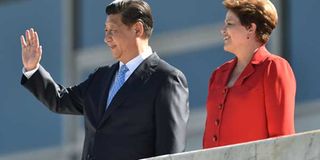Why BRICS media must play a bigger role

China's President Xi Jinping (L) is welcomed by his Brazilian counterpart Dilma Rousseff at Planalto Palace on July 17, 2014 in Brasilia. At a summit in Brazil, the BRICS group of emerging economic powers created the New Development Bank to finance infrastructure projects. AFP PHOTO/NELSON ALMEIDA
What you need to know:
- The rapid development of the Internet and the mobile web has provided emerging economies with more diversified, equalised and easy-to-access channels of communication.
- Taking into consideration the interests of the BRICS countries as a whole, their media organisations should strengthen cooperation and coordinate their stances.
In the next few weeks as I watch reruns of the exciting World Cup matches, my disappointment at the absence of Chinese footballers on the pitch will somehow be mitigated by the fact that many products and services for the event were from China.
For example, many of the mascot toys, including Fuleco the Armadillo, were made in China’s Zhejiang Province, and a Chinese photovoltaic company provided energy-saving solutions to the stadiums.
The sixth BRICS summit kicked off soon after the World Cup in Brazil’s beautiful coastal city of Fortaleza, where the Heads of State of the five member countries – Brazil, Russia, India, China and South Africa – met to discuss issues such as solutions to economic challenges.
Every BRICS summit provides a great opportunity for its member states to deepen mutual understanding, enhance cooperation and promote development.
Since the establishment of the BRICS mechanism, its member countries have made strides in cooperation in trade, investment, technology and financing.
Their combined GDP accounts for one fifth of the world’s total, and each member has become the most powerful emerging economy in its respective region. Their willingness to participate in international affairs has also constantly grown.
More than 20 years after the end of the Cold War, the global information flow remains unbalanced. Voices of developing countries are often drowned out by the much louder media of the West.
The rapid development of the Internet and the mobile web has provided emerging economies with more diversified, equalised and easy-to-access channels of communication.
The dynamics of the world media industry are also undergoing profound changes, with the voices of media organisations in emerging economies gradually strengthening.
SOFT POWER WEAK
Some critics say the BRICS countries have acquired formidable economic strength, but their soft power remains weak. The influence of their media organisations is yet to improve.
BRICS countries still lack the ability to express their will and project their strengths in a concerted manner.
Media organisations of the BRICS countries face similar external environments and have similar motivations.
First, taking into consideration the interests of the BRICS countries as a whole, their media organisations should strengthen cooperation and coordinate their stances.
This is a situation media organisations of BRICS countries have to face: with rapid and well-recognised economic development in their countries, BRICS members are being required to shoulder increasingly heavy international responsibilities. However, the rules of burden distribution and execution are still in favour of traditional Western powers.
Second, they should exchange experience among them with the purpose of safeguarding the images of their countries. They should learn to tell facts in an objective and effective manner.
Third, they should make use of the platform of the World Media Summit to help enhance mutual trust and clear up misunderstandings.
Initiated in 2009 by Xinhua News Agency and other well-known global news organisations, the WMS, with the theme of Cooperation, Action, Win-Win and Development, has been growing over the years.
Fourth, these organisations should jointly confront the challenges presented by new media and new technologies through cooperation projects.
Technologies such as cloud computing, big data and Internet of Things have changed the way information technology is developed and applied, opening a new chapter of informatisation.
Mr Li is the president of Xinhua News Agency.



